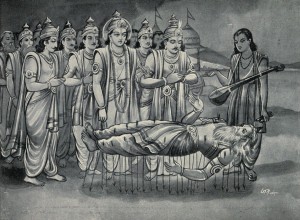On 6th February this year, I was in India for the Kathakar International Storytelling Festival. I was standing underneath a Peepal tree, an audience of 400 people were buzzing in an open air amphitheatre that struggled to hold them all. I told the story of Sir Gawain and the Green Knight.
I hadn’t planned on telling it, but Giles Abbot had just told the story of The Loathly Lady and had thus done the hard work of introducing the Arthurian world and most of the characters. Looking back, I feel like Gawain was the perfect story to tell. For all sorts of reasons, but one seems most relevant right now.
There’s a moment in the story where two men kiss. It’s part of an elaborate, courtly game where they’re swapping prizes back and forth. I’ve told this story a lot in the UK and it’s always hard to get the right tone at that moment. But in Delhi that night there was palpable tension and joyous relief. Laughter, yes, but it didn’t feel homophobic. Instead, it felt like we had shared something, had stepped into a taboo place and found that it was not as dangerous as we’d thought.
I didn’t know at the time but while I was packing for the flight to Delhi the Indian Supreme Court had announced that it was going to investigate decriminalising the laws which make homosexuality illegal. The penal code, a product of the British Raj in India, has been the subject of much back and forth over recent years. That was the background against which Gawain and Bertilak pressed their lips together.
In a few weeks time, I’ll be telling The Bed of Arrows at The Beyond the Border Storytelling Festival. It’s a great story, one that I expect I’ll be writing about here a lot in the next few months. It’s a collection of stories from The Mahabharata, an imagined dialogue between Bhisma and Shikhandi after the war is over. At its core, it’s a story about gender identity and transition. About the way the world changes and old institutions – glorious, powerful, magnificent but brutal institutions – collapse and shift.

It’s also an Indian story. Some might call it a sacred story.
I’m not Indian. I’m not a Hindu. I’m a white British man. I am a direct descendant of a culture that profited from colonial brutality across the world. At the same time, the message in The Bed of Arrows feels enormously relevant and resonant to the culture I’m living in today, to the times I’m facing. I hope that, just like Sir Gawain and the Green Knight was exactly the right story to tell in Delhi, The Bed of Arrows will be exactly the right story to tell at Saint Donats. Right now, that means doing a lot of work in making sure I tell it as well as I can but also being open to the contentious issues that telling this story raises.
If you’re interested in queer Indian myth, I would heartily recommend Shikhandi and other tales they don’t tell you by Devdutt Patanaik. I was given two of his books as a gift by Nisha Tyagi of the British Council. I devoured them as I traveled around India—I can’t remember the last time I picked up a collection of stories, started at the beginning and read them all through in order. Devdutt gently explores the themes in each myth, reflects on what they mean and has inspired me enormously.
If you’re at Beyond the Border, do come and say “Hi.” It’s always good to meet a reader. See you there!
Leave a Reply